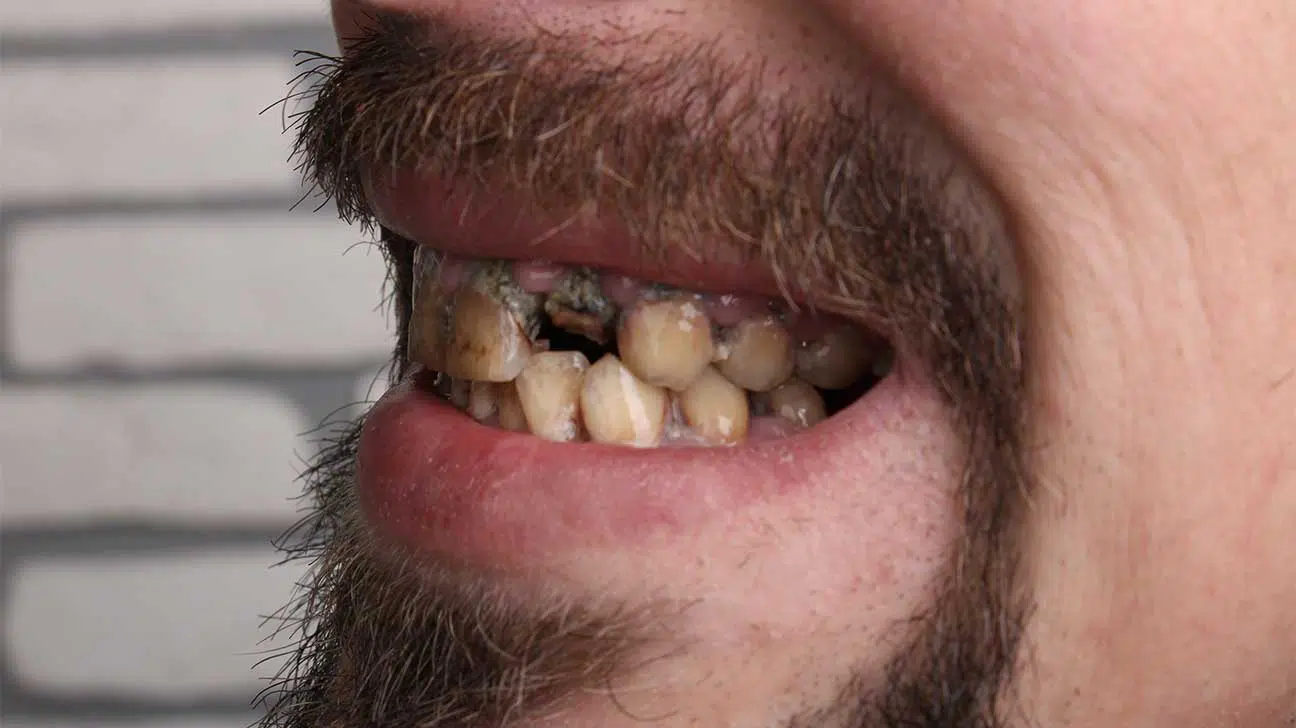What Is Coke Mouth?
Cocaine use has many harmful effects on the body. Coke mouth refers to all the risks cocaine has on the mouth, teeth, gum, and jaw. The use of cocaine can bring tooth decay, perforation, and excessive dry mouth. These problems can harm daily functions, such as eating and speaking.

Someone abusing cocaine will display many physical signs of cocaine use, including quickened blood pressure and heart rate, constricted blood vessels, and “coke mouth.”
Coke mouth refers to all the different oral problems that come with cocaine use. Constant substance use affects the mouth, teeth, gum, and jaw area.
Coke mouth can refer to:
- teeth grinding
- coke jaw
- periodontitis
- palatal perforation
Some of these defects arise with other short-term side effects of using cocaine, such as weight loss, while others develop alongside long-term effects of cocaine use like mental complications.
How Cocaine Affects Teeth
Snorting powdered cocaine and smoking crack cocaine, two of the most common routes of cocaine administration, can damage the teeth and jaw.
Bruxism
Bruxism is a teeth-grinding disorder that can be caused by improper sleep or high stress. It can also come from drug use, especially when abusing stimulant drugs, such as methamphetamine.
The high alertness and hyperactivity cocaine induces will result in teeth grinding. Excessive teeth grinding can break down the protective enamel coating on teeth.
Bruxism can lead to:
- tooth decay
- cavities
- broken down and brittle teeth
Dental Erosion
Many things can cause dental erosion, such as carbonated sodas, acid reflux disorders, and ingesting drugs.
When cocaine mixes with saliva, it becomes highly acidic. The additives, fillers, and other illegal drugs that cocaine is cut with also have high levels of acidity.
Tooth enamel easily breaks down when it’s exposed to acidity. This can damage the quality of teeth.
Dental erosion can also account for:
- missing teeth
- infections
- lacerations
- abrasions
Coke Jaw
As cocaine floods the body with a rush of dopamine, it speeds up many body functions. This leads to odd and erratic movements in the jaw.
Coke jaw is a cocaine slang term that is used to describe the uncontrollable back and forth jaw movements of someone high on cocaine. Coke jaw also includes intense jaw clenching.
Constantly moving and clenching the jaw can lead to intense jaw pain, damaged teeth, and temporomandibular disorders (TMD), which is damage to the jaw joints.
How Cocaine Affects Gums
Rubbing cocaine is common amongst people who engage in cocaine use. Placing cocaine on the gums will create a numbing effect that some find pleasurable.
However, placing cocaine on and in the gums, otherwise known as “gumming” has many adverse risks.
Periodontitis
Periodontitis is the medical term used for gum disease. This occurs when the soft tissue in the gums has been deeply damaged.
Smoking, rubbing, and snorting cocaine can cause periodontitis. When gums are exposed to the dangerous chemicals in cocaine, gums are negatively affected.
Gum disease can lead to many problems, including:
- tooth loss
- cardiovascular problems
- respiratory trouble
- mouth ulcers
Dry Mouth
Cocaine has the potential to cause xerostomia, or dry mouth. This comes from the decreased saliva flowing through your gums.
Even though a dry mouth may not seem as serious as other oral problems, decreased saliva can cause many long-term problems.
Problems from dry mouth include:
- discomfort in the mouth
- difficulty swallowing
- sore throat
- tooth decay
- nosebleeds
- bad breath
- mouth sores
- burning sensation in the mouth
Palatal Perforation
One of the most devastating impacts of cocaine use in the mouth area is oral palatal perforation. People who heavily snort cocaine are the most likely to develop this problem.
There are two palates in the mouth: a hard palate and a soft palate. The hard palate is located right behind the front top teeth. The soft palate is located closer to the throat.
As cocaine use deepens, lesions can develop in both palates. Lesions can lead to perforations, or holes in the roof of the mouth.
Having holes in your mouth can cause:
- a limited ability to speak
- trouble breathing
- difficulty hearing
- eating and drinking difficulty
- nasal septum
- nasal cavities
Other Ways Cocaine Use Affects Mouth
The overall lifestyle that comes with drug addiction can ruin a person’s mouth.
Cocaine use can diminish a person’s desire to take care of their hygiene, meaning they’ll be flossing and brushing their teeth much less frequently.
Additionally, resorting to eating and drinking bad foods during drug use that can further damage teeth and dehydration is common in people who use cocaine.
This dehydration can cause a range of mouth defects.
Cocaine Addiction Treatment In Massachusetts
Lifelong sobriety can help you or a loved one recover from coke mouth and substance abuse disorder.
Spring Hill Recovery Center offers cocaine abuse treatment, which includes several different treatment approaches to address cravings, mental health, and cocaine withdrawal symptoms.
Reach out to a specialist today to learn more about our accredited drug treatment facility in Ashby, Massachusetts.
- HSE Drugs And Alcohol — Cocaine Factsheet http://www.drugs.ie/downloadDocs/2018/CocaineFactsheet_Web-A.pdf
- National Institute On Drug Abuse — How Is Cocaine Used https://nida.nih.gov/publications/research-reports/cocaine/how-cocaine-used
- National Library Of Medicine — Psychological Aspects And Treatment Of Patients With Nasal Septal Perforation Due To Cocaine Inhalation https://www.ncbi.nlm.nih.gov/pmc/articles/PMC2689536/


